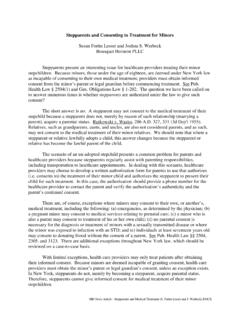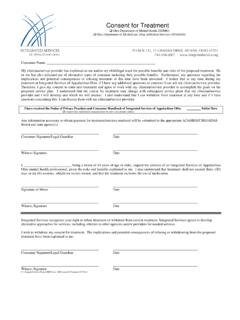Transcription of Informed Consent with Children: Ethical and Practical ...
1 Canadian Journal of Counselling I Revue canadienne de counseling / 2001, Vol. 35:2 109 Informed Consent with children : Ethical and Practical implications Julie J. Henkelman Robin D. Everall University of Alberta ABSTRACT This paper discusses ideas of Informed Consent as they apply to working with children . In general, counselling has accepted the view that each person has the right to control his/her own life; however, this right has traditionally been reserved for adults. This pa-per focuses on how counsellors can deal with issues of Consent with children . Sugges-tions are made for improving the Consent process with children in everyday practice. RESUME Cet article analyse les diff rentes id es sur le consentement clair tel qu'il s'applique au travail avec les enfants. En g n ral, la psychologie a admis l'opinion que chaque individu poss de le droit de contr ler sa propre vie.
2 Ce droit tait, cependant, r serv traditionnellement aux adultes. Cet article se concentre principalement sur les fa ons dont les psychologues peuvent traiter les questions de consentement telles qu'elles se pr sentent avec les enfants. Des suggestions sont offertes pour am liorer les proc dures de consentement des enfants dans la pratique courante. Informed Consent of the client is an ongoing concern of counsellors, and one that is carefully considered in working with adults. As counselling moves toward an increasingly collaborative view in which counselling is a mutually respectful relationship with the client and counsellor working towards a shared goal, these concerns increase. Little attention has been paid, however, to addressing Informed Consent with children and adolescents. This paper will consider how Informed Consent issues have developed concerning children , and will provide some important considerations to heed in working with this population.
3 The terms ' child ' or children ' will include both children and adolescents, unless adolescents are specified. The relevant historical and philosophical underpinnings of Informed Consent will be briefly traced to enhance an understanding of views and practices sur-rounding Informed Consent . The current status of Informed Consent with chil-dren will be examined to highlight the complexity of the issue when applied to clinical practice. Based on our assessment of current thinking, recommendations for practice will be given. Guidelines regarding the client-therapist relationship were generally developed from a paternalist medical model in which the physician decided what was in the This article is based on a presentation given by the authors at the 1999 Canadian Guid-ance and Counselling Association Conference. 110 Julie J.
4 Henkelman and Robin D. Everall patient/client's best interests to know (Faden & Beauchamp, 1986). This benefi-cence model allowed the balance of decision-making power to rest with the phy-sician rather than the patient. Paternalism is shown in the following practices: (a) the client is provided with only the information that the practitioner deems necessary (Crowhurst & Dobson, 1993); (b) obtaining Informed Consent is con-sidered a mundane duty to slog through before beginning the "real work" of therapy (Tymchuk, 1997); and (c) client knowledge and awareness of the treat-ment process will necessarily impede therapy (Sullivan, Martin, & Handelsman, 1993). In general, counselling goals include increasing individual independence and lessening emotional distress (Crowhurst & Dobson, 1993). Thus, paternalistic attitudes have been replaced in Ethical counselling practice by a more collabora-tive approach that is commensurate with fostering client independence.
5 Obtain-ing Informed Consent is now viewed as an important mechanism for ensuring that individual autonomy is respected. As Morrissey, Hofmann, &Thrope (1986) note: "The doctrine of Informed Consent finds its roots in the most fundamental and basic rights of free people: the inviolability of the human body and the right of a person to exercise complete dominion over his or her own person" (p. 13). Informed Consent is predicated on the belief that individual autonomy is a moral imperative and is respected and fostered in North American society (Gustafson, McNamara, & Jensen, 1994). While this paper maintains an individualist focus, it does not preclude consideration of familial, societal and cultural influences. The acceptance of the principles underlying Informed Consent has significant Ethical and Practical implications for practitioners and clients.
6 Of particular note is the aspect of informing for Consent . Often decisions of a psychological nature require information that may not be readily available to all people. The responsi-bility placed on the counsellor shifts from making decisions for the client to a collaborative orientation in which the client is provided all necessary informa-tion to make an Informed decision. Thus, the counsellor's role becomes one of responsibly enabling another to make a careful, considered decision. The prevailing legal standard is the "reasonable practitioner" model in which the counsellor can be held accountable to what the courts decide a "reasonable" practitioner would do (Crowhurst & Dobson, 1993; Jensen, McNamara, & Gustafson, 1991). However, it is difficult to precisely spell out legal decisions made regarding Informed Consent as the meaning of truly informing for Consent continues to evolve in its Practical application.
7 Common law, unwritten law based upon custom or court decision, strongly influences our understanding and application of Informed Consent issues as there is limited statutory law which legislate the process of obtaining Informed Consent . Each practitioner needs to determine the specific codes and doctrines relevant to his/her area of practice, both geographic and specialization. In addition to being familiar with appropri-ate provincial legislation, practitioners can refer to the following articles for fur-ther information in legal matters: Crowhurst & Dobson, 1993; Hesson, Bakal, & Dobson, 1993; J. S. C. v. Wren, 1987; Lawrence & Robinson Kurpius, 2000; Tymchuk, 1997. Informed Consent with children 1 1 1 Informed Consent has developed from the view that people are competent to make decisions regarding their own person.
8 It is important that the Consent ob-tained is truly Informed ; however, it should be acknowledged that obtaining in-formed Consent can at times be challenging. The struggle that occurs from fully respecting each individual's right to make decisions is highlighted in the com-plexity of engaging in Consent practices with children . Consent is understood as having three necessary components: a demonstrated competence for decision making, voluntariness, and understanding (Croxton, Churchill, & Fellin, 1988; Tymchuk, 1997). Competence is defined as the ability to decide whether or not to participate in treatment , to withdraw or continue dur-ing the process of treatment , and to make these choices known in an understand-able way. A voluntary decision must be made in the absence of coercion, either implied or actual. The final element, understanding, is the person's degree of discernment regarding the process and ramifications of the treatment being pre-sented.
9 Assessing another person's understanding can be difficult, as issues such as language, culture, and cognitive or emotional development are relevant. For Consent to be considered Informed , Tymchuk (1997) indicates four addi-tional criteria: an indication of choice, the reasonableness of the choice made within the circumstances, adequate understanding, and adherence to a decision-making process that minimally includes evaluation of risks and benefits of the treatment process. Similarly, Croxton et al. (1988) indicate the need for knowl-edge defined as a "full explanation of the potential risks and benefits of the proposed procedures along with the exploration of alternative means of interven-tion" (p. 5). In order to ensure Informed Consent has been obtained, the counsel-lor needs to be certain of two important factors: a) that the information regarding the proposed treatment and all viable alternatives has been fully pre-sented and b) that the client has indeed understood this information.
10 Ensuring that the Consent obtained is truly Informed can become a complex and lengthy assessment task. Applicability to children Traditionally, children have not been granted autonomy because it has been assumed that they are not competent to make decisions regarding their own per-son. While adults are presumed competent, children are required to prove com-petence as age is used as an arbitrary condition for Consent (Levine, Anderson, Ferretti, & Steinberg, 1993). Specific questions have been raised about children 's abilities to understand what they are agreeing to, including possible future conse-quences. It has been argued that children have limited cognitive understanding and a lack of experience (Powell & Vacha-Haase, 1994), both of which are neces-sary to make sound decisions. Granting rights of Consent to children therefore becomes a developmental issue.



















